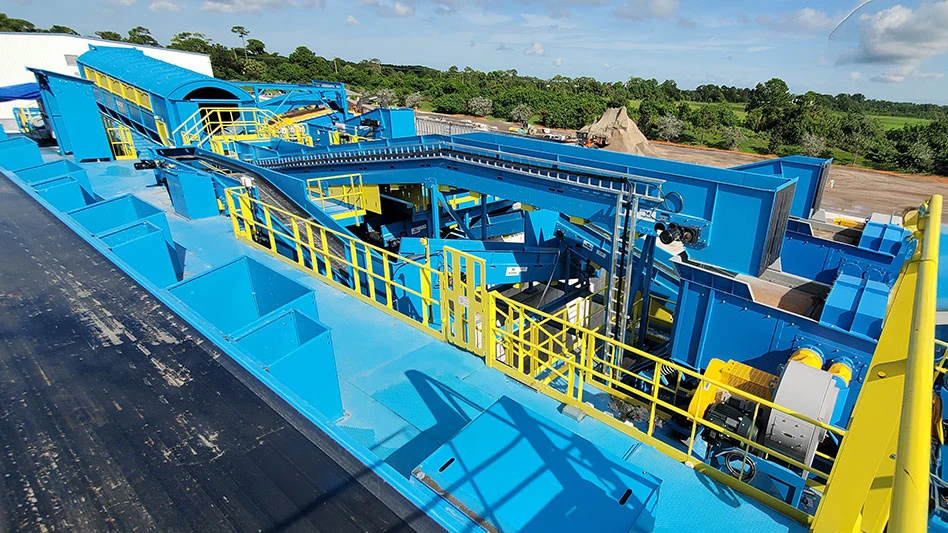Once the entrepreneurial bug bites, it can be hard to resist the urge to start a business—even if nagging doubts are just beneath the surface.If Kevin and Jacqueline Little had such nagging doubts when they founded Lake Erie Recycling in 1989, it would be understandable. The company started with just $25,000 in savings, most of which went immediately toward leasing a building and buying a baler, forklift and a scale.But what the Littles lacked in financial capital they made up for in human capital, including Kevin’s knowledge garnered from several years in the paper industry, a willingness to work long (and often non-traditional) hours and the ability to shepherd the company’s finances carefully through the start-up phase.
A BACKGROUND IN PAPER
Kevin Little became familiar with the recycling industry in the Great Lakes region as a sales manager with the Container Corp. of America (now part of Smurfit-Stone Container).
As with many start-up business owners, Little saw an opportunity for a new type of business that would find a waiting market in an under-served market segment. “We had seen a need for added collection and processing in the Toledo area,” says Kevin. “None of the bigger haulers had processing plants here,” he notes.
In 1989, Kevin and Jacqueline convinced each other that the time was right to take the risk and start a paper recycling business. “We started with $25,000 of personal savings—no loans,” says Kevin, who notes that neither the recycling industry nor the Toledo area had a substantial number of African-American business owners when they started the company in 1989. (A situation that has not changed drastically in the ensuing decade.)
But Little is quick to point out that the business started and has grown without the need of any minority loans, but instead was the result of hard work and the ability to draw upon knowledge and connections on the mill side cultivated after spending years in the paper industry.“The experience with Container Corp. keyed me into the markets and which material mills demand,” says Kevin. “I knew the people to call on, what grades they wanted and their quality needs.”Using the $25,000, the Littles opened a small processing plant in the corner of a mostly vacant industrial building in north Toledo. “We started with $25,000 when a new forklift cost $18,000,” notes Jacqueline, without needing to add that the company’s first forklift and baler were not top-of-the-line new pieces of equipment.
Early on, Kevin would alternate between wearing a suit and tie on some days to solicit new accounts to collect generated office or industrial scrap paper, and then switch to work boots and work clothes on other days to process what had been collected.
BUILDING A MULTI-GRADE BUSINESS
As recyclers know, lining up customers in their industry involves a lot of work on both ends of the transaction—making connections with mills and consumers, and also establishing reliable sources of generated scrap.
Doing this for just one commodity or paper grade can be challenging enough, but Lake Erie Recycling has built a business that now collects and processes 10 grades of paper as well as several types of nonferrous metals.
“The first employee I hired had an in-depth knowledge of the metals area,” says Kevin, regarding his company’s entrance into the recycling of UBCs (used beverage cans) and other nonferrous metals.
The company has long since left its initial space in the old industrial building for a new 40,000 square feet (and growing) company-owned processing facility on land in an industrial park. Many other changes have also occurred in the company’s 11-year history.
The company is now operating its second new Excel baler (this one a two-ram model), using the versatile machine to process 36,000 tons of material each year—most of it being paper grades ranging from old corrugated containers (OCC) and old newspapers (ONP) to mixed office paper and high grades. Additionally, the company processes some 200 tons of UBCs and other metals.
Both figures could grow if the City of Toledo and other communities in Lucas County expand their curbside recycling collection efforts. “The collectors or haulers look at us as a surrogate operation, not as a competitor since we don’t operate a fleet of roll-off trucks,” says Kevin.On a typical business day, trucks operated by the area’s major haulers will drop off the recyclables they have collected in and around the Toledo area.
Today the company has 20 employees (including Kevin and Jacqueline) processing materials brought in by haulers as well as materials generated by commercial, office and industrial customers who put their scrap paper and light metals into 95-gallon Toter containers, Gaylord boxes and other bins emptied by Lake Erie’s one truck.
The company also accepts material across the scale, weighing cans and other nonferrous metals as well as newspapers and other paper grades hauled in by Toledoans.
RIDING THE WAVES
The recycled paper price “bubble” of 1995 is remembered by many in the industry for the damage it caused to businesses stuck with overpriced inventory when the bubble burst in the late summer and fall of that year.
The Littles were not among those damaged by the price roller-coaster, however. To the contrary, the company took advantage of the revenue climb on the upside to put aside money to buy the five acres of property that now serves as the home of Lake Erie Recycling.
“We didn’t begin with state-of-the-art equipment,” Kevin notes. “We were and are low-cost producers, and that helped us weather the storm. We knew the odds are against a small business surviving.”
“When the markets got good, there were a lot of people who jumped into it and suffered from overkill—new equipment with conveyors here and conveyors there,” adds Kevin.
“We run a streamlined ship,” says Kevin. “There’s not a lot of excess fat—that’s the only way to be profitable in this business. Adapting to changes in pricing is not as big a problem,” he contends. After the price plunges of late 1995, “we stuck to our pick-up schedules despite pricing challenges such as when ONP is $20 per ton and I can’t get rid of it.”
A diversified product mix has also played out to Lake Erie Recycling’s advantage. “Even in down markets, we’re diversified, so we can get some help from whichever grades are the healthiest or from the metals side,” says Kevin. “It’s one thing that separates us from our competitors.”
Misperceptions of their business can be another source of problems, Jacqueline and Kevin note. This can be especially frustrating when dealing with the lending industry—or with potential generating customers.
“They often know nothing about it,” Kevin says of lenders as well as other business owners he comes into contact with, including those he is trying to convince to become customers. “We do a lot of explaining. A lot of the businesses were throwing stuff away, and didn’t really want to know about us until we could explain the dollars and cents of it.”
Kevin and Jacqueline hope that the explanations will come more easily in the future, and Lake Erie Recycling does its part to support school-age recycling education programs. “We’re always willing to host tours of elementary school students—they’re our future recyclers,” says Jacqueline.
FOCUSED ON GROWTH
Having spent more than 10 years building a stable business, the Littles now face the challenge of managing a substantial business while keeping their eyes open for further growth opportunities.
Kevin calls managing the commodities that Lake Erie Recycling handles “the part I like best about this business. We are our own economists. Do we dump all of our OCC? We factor in the weather and any number of other considerations, and then we make the internal decisions.”
Properly grading and packaging materials will also remain a key to the company’s future prospects, the couple contends. “Grading is what separates who is profitable—knowing the price difference between SWL (sorted white ledger) and mixed office paper and whether it’s worth sorting,” remarks Kevin. “It’s a fast-changing industry, even on a monthly basis. And in the Snow Belt, weather can make prices spike and vary from what publications report.”
They are uncertain whether the metals side of the business will offer a growth opportunity, but they are willing to give the sector a chance. “We handle the cans almost as a loss leader,” says Kevin. “Our hours are different—an hour later on weekdays and with extra time on Saturdays. We keep the scale area clean and paved, and help people carry their materials in. We want to make it comfortable for the mother in a business suit or other family members to bring materials in,” he adds.
The thinking is that current and future business owners who are exposed to Lake Erie Recycling in this clean setting will also feel comfortable dealing with the company in any future business opportunities.
Brokerage has also become a growing part of the business, and Kevin estimates that more than 25% of the company’s sales volume comes from the brokering of materials that never actually enter the Lake Erie facility for processing.
Through brokerage and its higher-volume packing operations, Lake Erie Recycling has widened its reach. “We ship materials to California, and southwest to Oklahoma and Alabama,” says Kevin. The company’s ability to ship even further could be aided by the addition of a rail siding, although progress on that front has been slow and frustrating, they report. Most of their collection still takes place within a 40-mile radius.
The journey to grow the company to the point it is now at has been both challenging and fun, Kevin and Jacqueline agree.
“It takes a special type of person to deal with the terrain that comes with this job,” says Kevin. “You’ll get cold and dirty on the operations side, and nervous on the brokerage side,” he warns. “But in the end, it has provided rewards.” RT
The author is the editor of Recycling Today.

Explore the June 2000 Issue
Check out more from this issue and find your next story to read.
Latest from Recycling Today
- Greenwave raises revenue but loses money in Q2 2025
- Recycled steel prices hold steady
- EY says India’s need for scrap imports will continue
- Coming full circle
- Amcor, DCM introduce fertilizer packaging with 35 percent recycled content
- Comstock Metals gets closer to commissioning commercial-scale solar panel recycling facility
- Washington selects Circular Action Alliance as PRO
- Smurfit Westrock expands in Latin America





